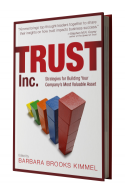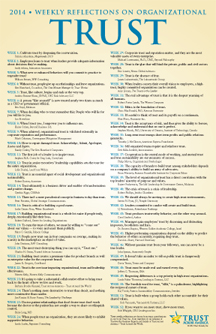
Late last year Trust Across America-Trust Around the World published the first in a planned series of award-winning books. The book, TRUST INC. Strategies for Building Your Company’s Most Valuable Asset brings together the wisdom of 32 experts and is divided into six chapters:
- Why Trust Matters
- Trust in Practice
- Trustworthy Leadership
- Building Trustworthy Teams
- Restoring Trust
- The Future of Trust
For the next six days, our blog will extract highlights from each chapter. Each one can serve as an excellent resource in helping leaders understand why trust matters, and provide tools for those who choose to implement trust building programs in their organization. We know our readers love lists. Today’s blog contains five.
Charles H. Green & Barbara Brooks Kimmel discuss “Trustworthiness in Action” and offer a “Top Ten List” of how companies can increase trustworthiness.
#1 Trustworthy leadership – Very simply, a culture of trust cannot exist with an untrustworthy leader.
#2 Transformation – Productivity and execution begin when the CEO creates a set of values and goals that are shared, accepted and adopted by all stakeholders.
#3Tools – There are many trust tools CEOs can use to build trust with their internal and external stakeholders. These run the gamut from metrics and assessments to online surveys.
#4 Treatment– The Golden Rule says to “treat others the way you want to be treated.” This certainly holds true for trust.
#5 Teamwork – Teamwork leads to better decisions and better outcomes. Teams create trust, and trust creates teams.
#6 Talk – Your stakeholders need to know what steps you are taking to build a trustworthy organization. Quarterly numbers are no longer the be all and end all.
#7 Truth – Truth-telling is at the core of trust. Any CEO who wants to build a trustworthy organization must have an extremely comfortable relationship with the truth.
#8 Time – Building a culture of trustworthy business does not happen overnight. It takes time, maybe even years – but not decades.
#9 Transparency – Merriam Webster defines “transparent” as visibility or accessibility of information, especially with business practices. Any CEO who thinks he or she can still hide behind a veil of secrecy need only spend a few minutes on social media reading what their stakeholders are saying.
#10 Thoughtful – Not all stakeholders need to know the company’s trade secrets, or what the CEO had for dinner. But if your company is serious about increasing trustworthiness, consider engaging all your stakeholders in rich, thoughtful conversations.
***********
In “What Does a Trustworthy Company Look Like” Peter Firestein addresses how you know a trustworthy company when you see one.
By far the best assessment of whether a company is worthy of trust lies in an answer to the question: “Who trusts it?”
- A trusted company’s shares trade at a premium to its competitors’ based on investors’ expectations of strong performance in the future. This expectation, itself, is a matter of belief in customers’ trust in its products, lenders’ trust in its judgment, and regulators’ trust in its practices.
- When unwanted events occur, a trusted company receives the benefit of the doubt until the facts can be established. It is not assumed to be in the wrong.
- A trusted company attracts the best available employees, helping to ensure that it will continue to hold the trust of stakeholders into the next generation.
- A trusted company’s practices and strategies are adopted by other companies wishing to emulate its success. Those strategies enter the curricula of business schools to be studied and adapted.
- Concentration on the continued worthiness of a trusted company is spread evenly across all levels of the company’s hierarchy. Maintaining and strengthening trust in the company is a career-long preoccupation of virtually everyone who works there.
**********
In “Making Your Values Real to Enable Trust” Jeffrey Thomson discusses two ways to make trust tangible:
How do you make your organizational values real and foundational to building trust, organizational health, and creating great business outcomes? Two very simple suggestions:
- The CEO, not a committee or consultant, must set the core values. Why? Tone at the top. Genuine, authentic and sustained exemplary behaviors are required and should be expected from the leader and the leadership team.
- Make the effort to inculcate the core values into on-going performance reviews and appraisal processes to drive regular, often tough, conversations about the behaviors (the “how”) that lead to the accomplishments (the “what”).
**********
In “Choosing Candor the Language of Trust” Laura Rittenhouse discusses three levels of CEO Candor.
Just Talk: AMD 2011 Shareholder Letter Introduction
AMD enters 2012 firmly focused on becoming a solid execution engine, while positioning ourselves to take advantage of growth opportunities driven by a fundamental shift in the computing ecosystem.
Real Talk: Lockheed Martin 2011 Shareholder Letter Introduction
This is a milestone year for Lockheed Martin: our 100th anniversary. Our company’s success over the past century is due to the exceptional character and ingenuity of the hundreds of thousands of people who have walked through the doors of our heritage companies. As this remarkable enterprise begins its second century, we and our customers face unprecedented global security challenges and an uncertain economic environment.
Transforming Talk: Eaton Corporation 2011 Shareholder Letter Introduction
In 1911, young entrepreneur Joseph Oriel Eaton staked his future on a transformational axle for the fledgling U.S. trucking industry. He bet upon a megatrend — that the transportation industry would become a hallmark of American industry and our economy. And he was right.
**********
And finally Robert & Gregg Vanourek address how “Stewards Build Trust” and provide a partial list of trust busters.
Trust is complex. Many behaviors can undermine trust. Below is a partial list of “trust busters”:
- Abusive behavior
- Accountability lacking
- Appreciation lacking
- Arbitrary use of power
- Blaming
- Commitments not met
- Communication poor or secretive
- Compensation plans encourage inappropriate behavior
- Controls/processes lacking or excessive
- Corner cutting to get results
I hope you have enjoyed this sneak peak into the trust treasures contained in our book. Did I mention that it has won both a Nautilus Business Book and Eric Hoffer Grand Business Prize Award? Tomorrow I’ll pull some similar gems from Trust in Practice. Check back with us soon.
If you have enjoyed this brief look behind the door, follow this link to order the book online.
Barbara Brooks Kimmel is the Executive Director of Trust Across America-Trust Around the World whose mission is to help organizations build trust. She is also the editor of the award winning TRUST INC. book series. In 2012 Barbara was named “One of 25 Women Changing the World” by Good Business International.
. 

If you would like to communicate directly with Barbara, drop her a note at Barbara@trustacrossamerica.com
Copyright © 2014, Next Decade, Inc.








Recent Comments